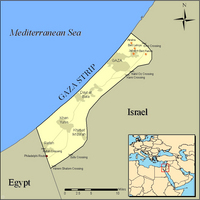Hezbollah appears to be willing to escalate the conflict with Israel. At least three Katyusha rockets were fired into northern Israel, striking in western Galilee and lightly wounding two civilians, according to Haaretz. Some reports indicate as many as five Katyusha rockets landed in northern Israel.
“Israel Defense Forces troops immediately fired five artillery shells at Lebanon in response to the rockets,” Haaretz reported. Israeli sources told Haaretz that it is likely that Palestinian terror groups operating with the permission and support of Hezbollah likely carried out the strike.
The rocket attack is the first such incident from Lebanon since the July 2006 war between Israel and Hezbollah. In the summer of 2006, Hezbollah launched a raid and kidnapped two Israeli soldiers at an outpost on the border with Lebanon as Israeli troops were fighting the Palestinians after similar kidnapping of a soldier by Hamas. Both Hamas and Hezbollah are backed by Iran and Syria. Hezbollah then began rocketing northern Israel, prompting Israeli airstrikes, covert raids, and eventually a ground operation in southern Lebanon.
Hezbollah fought the Israelis to a standstill after a month’s fighting as international pressure forced an end to the operation. Israeli leaders vowed to destroy Hezbollah’s ability to wage war, but Hezbollah’s military and political arms remained intact. In the spring of 2008, Hezbollah brought Lebanon to the brink of civil war after street battles with rival Sunni and Druze political groups took place in Beirut and the North. Hezbollah forced the government to bring the party into the government and obtained veto power over government decisions.
Hezbollah has refused to disband its military wing and replenished its cache of short- and medium-range rockets. In November 2008, Israeli Defense Minister Ehud Barak told the Knesset that Hezbollah is three times stronger that it was prior to the 2006 war in Lebanon.
Today’s rocket attack comes as Israel is battling Hamas in the Gaza Strip after hundreds of rockets and mortars have been fired into southern Israel after the expiration of a six-month truce.
Just yesterday, Hassan Nasrallah, the political leader of Hezbollah, said his terror group is prepared to fight Israel if attacked and castigated Arab states for failing to support Hamas. “We are prepared for every possibility and are ready for all aggression. … The Zionists will discover that the war they had in July (2006) was a walk in the park if we compare it to what we’ve prepared for every new aggression,” he said.
Two days ago, Saad Hariri, Lebanon’s parliamentary majority leader, said that the secretary of Iran’s Supreme National Security Council assured him that Hezbollah would not attack Israel from Lebanon to aid Hamas in Gaza. “What Jalili said greatly calms us,” Hariri said.
Israeli military and political leaders have made it clear that any attack from Hezbollah would be considered an attack by the Lebanese government, and they would bring the full weight of Israeli military power to bear on Lebanese institutions.
Israel expands operations in southern Gaza
The IDF warned Palestinians in the southern city of Rafah that attacks on homes and other buildings used as weapons smuggling tunnels and depots would be hit. “Because Hamas uses your houses to hide and smuggle military weapons, the IDF will attack the area, between the Egyptian border until the beach road,” flyers dropped by the Israeli Air Force stated, according to The Jerusalem Post.
Hamas has maintained its stocks of longer-range rockets and other weapon through sophisticated smuggling tunnels build underneath the Philadelpi Corridor along the border between Gaza and Egypt. Nine rockets were fired into southern Israel on Wednesday despite the ongoing operation.
Israeli troops have also been reported to be advancing on the city of Khan Younis in southern Gaza, although the reports could not be verified. Yesterday, Israeli military and political leaders mulled expanding the operation in southern Gaza.
The Israeli Air Force conducted more than 60 airstrikes in Gaza on Wednesday. Airstrikes killed Hamas’ commander responsible for launching rocket attacks from Rafah and Hamas’ commander in Khan Younis.
Yesterday, the IDF announced that a three-hour cease-fire beginning at 1:00 AM local time would commence each day to allow for humanitarian aid to flow into Gaza. The IDF established several “humanitarian corridors” to facilitate the flow of supplies to Palestinian civilians.
For additional information on the ground operation in Gaza, see:
• Israeli forces focus on northern Gaza
Jan. 7, 2009
Jan. 5, 2009









2 Comments
I do not see what Hezbollah would gain by attacking Israel during an election when the Israeli government needs to appear tough in order to win. They just got defacto veto power in Lebanon, why risk getting destroyed. After the election, if a pacifist coalition develops in Israel, Hezbollah could launch rockets for prestige and to help Iran drive up the price of oil.
I doubt if Iran wants a Bebe Netanyahu victory either. If they pushed Hezbollah to attack, they would either have to face that prospect of Netanyahu or having the current Israeli government feel they would have to destroy Hezbollah to keep its standing. Either way, Iran loses.
The Israeli’s have EVERY right to conduct offensive ops in Gaza. Hamas has continuosly fired rockets at Israeli cities, and to stop it the IDF must do wat the US Army and Marine Corps did in Fallujah. Clear it by sectors, house to house, CQB all the way. They want to be “martyrs”, well, the IDF will make that happen.